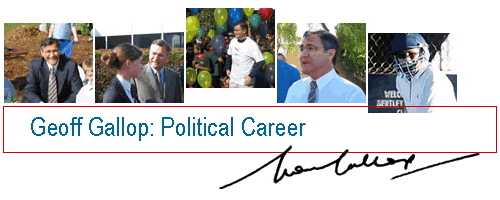
The main phases of Dr Geoff Gallop's political career, his associated speeches and the general tenor of his academic publications can be identified as follows.
Political context - 1983 to 1990
On 25 February 1983 the Australian Labor Party parliamentary leader Brian Thomas Burke was sworn in as Western Australia's 25th and third youngest ever Premier. Burke's election victory earlier in the month ended a twenty-four year period in which the ALP had only been in power for one term, from 1971 to 1974, and then with a precarious one seat majority. From the outset the Burke Government set out to develop strong links between government and private enterprise, in part with the objective of reducing the dependence of government on taxation and other traditional sources of revenue by more active involvement in the commercial sector. The government was re-elected in February 1986 but problems developed rapidly after the stock market crash of October 1987 though Burke himself had resigned as Premier and as an MP in February 1988. His successor Peter Dowding led the party to a narrow victory in February 1989 but a year later he was deposed by his own party in the midst of the spiralling problems and financial losses resulting from the so-called WA Inc. era.1
Academic political commentator and local councillor - 1983 to 1986
At the time the Burke Government came to power Geoff Gallop was working as a lecturer in social and political theory at Murdoch University and in the same year he was elected unopposed to the Fremantle City Council.
During the first term of the Burke Government, Gallop acted as a regular political commentator in the media and wrote papers both on the election itself and on the policies of the Government and this provides an insight into the significance he attached to the election of the new government. Thus, in his account of the 1983 election published in the following year for the journal Politics he referred to Labor's 'decisive victory' as a 'personal triumph for the thirty-four-year-old Brian Burke' and he suggested that:
'It was clearly apparent that Labor's new leader had the support of the wider party, although sections of the traditional left expressed misgivings about the pragmatic and business like approach which they adopted.'2
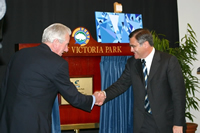 Curtin University Library. Geoff Gallop Collection. Records of Geoff Gallop. Geoff Gallop at Centro shopping centre, Victoria Park, 2004. GG00020/25.
Curtin University Library. Geoff Gallop Collection. Records of Geoff Gallop. Geoff Gallop at Centro shopping centre, Victoria Park, 2004. GG00020/25.
In the same year Gallop wrote for the Canberra Bulletin of Public Administration a survey entitled 'The Burke Labor government: changes made and the policies followed since the 1983 elections'.3 Major sections in the article included 'The machinery of government' with reference also to a 'massive range of inquiries into various aspects of policy and administration'; 'Government and parliament'; and 'Economic Development' with an emphasis on the government's search for new sources of revenue to supplement state taxes and charges which had 'reached maximum levels'. In the process, Gallop described the Burke government as having a 'reasonably well developed sense of its own political priorities' but having to deal with 'the emergence of formalised factions in the Labor Party in Western Australia'.
Then in 1985 during the lead up to the 1986 election Gallop wrote a feature piece for the Current Affairs Bulletin headed 'Politics in Western Australia: A State of Excitement' and focussing on the Burke Labor Government as setting out to 'establish itself as a managerially competent and financially responsible alternative to the Liberals.4 In the same year too his chapter on 'Western Australia' was published in a Canberra-based publication on Australian State Politics in which he concluded that notwithstanding the significant changes in approach of the Burke Government, Western Australia 'persists as a development-oriented state searching for foreign capital to develop its resources and forcefully pursuing its interests within the federation'.5
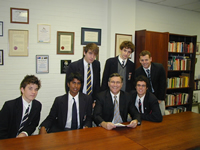 Curtin University Library. Geoff Gallop Collection. Records of Geoff Gallop. Geoff Gallop with students at Guildford Grammar School, 2005. GG00020/73.
Curtin University Library. Geoff Gallop Collection. Records of Geoff Gallop. Geoff Gallop with students at Guildford Grammar School, 2005. GG00020/73.
In one interesting excursion as a political commentator on the overseas political scene politics he wrote an article for Australian Outlook entitled 'The future of Thatcherism'.6 The article was published a year prior to the 1987 British election when Thatcher, as it eventuated, comfortably won a third term in office. Gallop's argument in the article can be summarised as suggesting that the 'Thatcher Revolution' had stalled 'in the face of clear economic and political limits to its future development' and that Margaret Thatcher had handled tensions within the party 'in an unusually hesitant and incompetent manner'. However, even at this stage, Gallop conceded there were doubts about the 'ability of both Labour and the Alliance [i.e. the Liberal Alliance] to maintain their current position in the context of a general election'. This prediction proved to be well-founded when the Conservatives were returned with a still commanding majority in 1987.
MLA for Victoria Park - 1986 to 2006
Geoff Gallop was not a candidate at the February 1986 general election but entered the Legislative Assembly shortly after when he won a by election in June for the ALP in the Victoria Park seat vacated by former ALP leader Ron Davies: this followed Davies' appointment as the State's Agent General in London. Despite a swing of nearly 9 per cent to the Liberals Gallop won the seat comfortably with an absolute majority over the other three candidates.
According to Gallop himself his original ambition had been to represent the seat of Cockburn south of Fremantle where the sitting member had died in early April. However, he eventually accepted the Victoria Park endorsement and purchased a home in the electorate where he lived for the remainder of his political career.
During his 21 years as member for Victoria Park he secured an absolute majority on the primary count in all elections except 1993 and 1996: his smallest winning margin in 1993 was just under 1900 votes while his most substantial victory came in 2005 when he polled within a few hundred votes of a two-to-one majority over his opponent after preferences.
As a constituency politician Gallop worked on the basis of keeping Friday, a Legislative Assembly non-sitting day, set aside for working in the electorate and dealing with local concerns. Constituency issues were rarely a problem for him though in 2003 a dispute arose over a proposal to expand the capacity of the Nyandi women's prison in Bentley. In this instance, however, boundary changes resulting from a redistribution, and in effect from the 2005 election, saw the prison site relocated within the neighbouring electorate of South Perth.7
During his years representing the constituency Gallop strongly identified with the area and published short histories of suburbs in the electorate in the community press. Thus. in 1989, for example, there appeared 'From the Swan to the Canning: Historical Notes on Victoria Park and Surrounding Districts'.8
In 1997 he also wrote an article entitled 'The Role of a Member of Parliament' and this was published in 1998 in an omnibus volume, 'A State of Reform', which is discussed further below.9 Originally written for new members of the State Parliamentary Labor Party in 1997 the article was also published as 'Combating Cynicism' in The Parliamentarian in the same year.10 Much of article was concerned with proposing means to counter the apparent poor standing of politicians in the community by developing both a 'new professionalism' in terms of applying managerial principles and practices to their works and new standards of conduct.
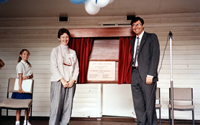 Curtin University Library. Geoff Gallop Collection. Records of Geoff Gallop. Geoff Gallop at the opening of the Arts Library building at Mt Lawley Primary School, 12 April 1990. GG00007/1/8.
Curtin University Library. Geoff Gallop Collection. Records of Geoff Gallop. Geoff Gallop at the opening of the Arts Library building at Mt Lawley Primary School, 12 April 1990. GG00007/1/8.
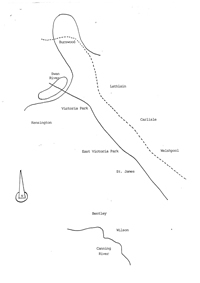 First page of 'From the Swan to the Canning'.
First page of 'From the Swan to the Canning'.
Curtin University Library. Geoff Gallop Collection. Records of Geoff Gallop. Gallop, Geoff. From the Swan to the Canning; historical note on Victoria Park and surrounding districts, December 1989. GG00021/4/7.
These issues are explored further in Geoff Gallop: Member for Victoria Park.
Backbench member - 1986 to 1990
Gallop had entered Parliament at close to the peak time of support for the Burke Government with its problems beginning in the following year with the stock market crash of October 1987 and the near collapse of the Teachers' Credit Union.
His maiden (inaugural) speech in the Legislative Assembly was delivered on 18 June 1986,11 in the course of which he placed strong emphasis on constitutional reform arguing for the necessity to consolidate the two basic State Acts, the Constitution Act 1889 12 and the Constitution Acts Amendment Act 1899. Elsewhere in the speech, developing a theme which he pursued throughout his career, he argued for federalism as 'the most appropriate form of government for Australia' though only, in his view, if the system retained the capacity for development and flexibility.
Subsequently, in his own collection of speeches published in 1990 as 'Labor's Case for Parliamentary democracy' he included the following speeches from this era
- July 1986 - speech entitled 'Fair and Free Elections' proposing the establishment of a Western Australian Electoral Commission and effectively one-vote-one-value for both Houses.
- September 1988 - speaking in opposition to a Liberal party proposal for citizen-initiated referendums
- April 1989 and June 1990 - supporting measures to provide for a means of resolving disagreements between the two Houses of State Parliament.13
These speeches subsequently also formed the basis of two of the fifteen articles published in 1998 in a volume entitled 'A State of Reform. Essays for a better Future'.14 In the 'Labor's case for Parliamentary Democracy' collection he also included a speech made in December 1989 in which he raised again the issue dealt with in his maiden speech, strongly supporting moves to consolidate the State's Constitution.15
In the meantime, in his very first year in Parliament, Gallop was elected to the Select Committee inquiring into the Sale of the Midland Abattoir land and in 1988 he joined the Public Accounts Committee, at that point of time the Assembly's most powerful standing committee. By March 1989 he had become its chairperson, a position then regarded as a major stepping stone to cabinet ranks. In fact this promotion came less than a year later leading to his resignation from the Public Accounts Committee in May 1990. In September 1989 he was also elected to the Select Committee on Land Conservation of which he remained a member until September 1991. However, his elevation to the ministry did prevent his election as a member of an all-party select committee to pursue means of achieving one of his cherished dreams, the consolidation of the State's constitution.
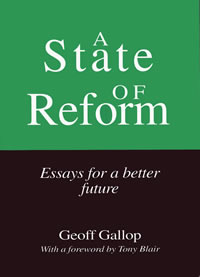 Cover of A State of Reform: Essays for a Better Future by Geoff Gallop, 1998.
Cover of A State of Reform: Essays for a Better Future by Geoff Gallop, 1998.
Cabinet minister in the Lawrence Government - 1990 to 1993
In February 1990 the ALP leadership became vacant following a successful move against Premier Dowding in caucus while he was overseas in Europe. In his stead the party elected Australia's first-ever woman Premier, Dr Carmen Lawrence, who had first entered the Legislative Assembly at the 1986 election. When her first cabinet was sworn in on 19 February, Gallop, as the most junior of the seventeen minsters, was made Minister for Education and, not surprisingly, Parliamentary and Electoral Reform.
In December of the same year he was also appointed Minister assisting the Treasurer. Following a substantial Cabinet reshuffle in February 1991 Gallop was given, in lieu of Education, the Fuel and Energy and the Microeconomic Reform portfolios. As previously indicated, his entry into the ministry had the consequence that he was unable to serve on the Joint Select Committee inquiring into the possibility of consolidating the State's two Constitution Acts, a committee which ultimately was unable to produce a report acceptable to all its members.
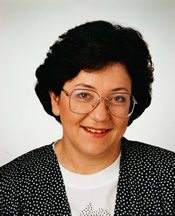 Curtin University Library. Carmen Lawrence Collection. Records of Carmen Lawrence. Carmen Lawrence, 1990. CUL00005/2/2
Curtin University Library. Carmen Lawrence Collection. Records of Carmen Lawrence. Carmen Lawrence, 1990. CUL00005/2/2
In Opposition - 1993 to October 1996
Labor lost office at the February 1993 election to the Coalition parties led by Richard Court and from 1993 until 2001 Geoff Gallop sat on the Opposition benches. With the departure of Carmen Lawrence to federal politics in February 1994, Ian Taylor served as Leader of the Opposition for a little over eight months with Kay Hallahan as his deputy. In October 1994, Jim McGinty took over the leadership with Gallop as his deputy.
During this period Gallop held a variety of shadow ministry appointments including Health and also, at times, Resources and Energy, Parliamentary and Electoral Reform, Public Sector Management, Accountability, Federal Affairs, Community Infrastructure and Sport and Recreation. He also served at one time or other on four parliamentary committees - Ancient Shipwrecks; Intervention in Child Birth; Procedure; and the Joint Standing Committee overseeing the work of the Commission on Government.
During this time, his small number of academic papers and addresses were directed towards issues relating to federalism, developing the theme that while federalism was the appropriate form of government for Australia, state rights should not be elevated above more fundamental human rights. In that context, he welcomed, to the extent that it had occurred, moves by the High Court to recognise the existence of implied human rights in the Australian Constitution.16 He also focussed on what became an increasingly significant issue in his own writing, namely what should be the appropriate relationship between government and business, concluding in the light of his analysis of privatisation issues raised by the Court Government that 'the ability of business to influence government ought itself to be subject to regulation and restriction if the public interest is to be protected'.17
Leader of the Opposition - 1996 to 2001
In October 1996 with an election likely to be called at any time, Jim McGinty stepped down as Opposition leader in favour of Gallop who accordingly led the party at the December poll. In this election Labor's representation fell by 5 seats to 19 out of 57 in the Legislative Assembly, numerically its worst result since the First World War. Nevertheless, despite this disappointing result Gallop retained the leadership without challenge until his success at the February 2001 election.
As Opposition leader he was Shadow Minister throughout for Federal Affairs and held the post of Shadow Treasurer (and later also for Finance) until August 1999. His other shadow portfolios at various times included the South West, Sport and Recreation and Regional Development.
During his four years in opposition, Gallop as Labor leader did have the advantage that, arising from the success of the Australian Democrats and the Greens, the Court Government lost its majority in the Legislative Council as from 22 May 1997. In this context, Gallop found himself from the outset embroiled in controversy when, during the interim period at a time when the government still retained its upper house majority, the Labour Relations Minister Graham Kierath pushed ahead with his controversial 'third wave' of industrial relations legislation.18 The dispute led to the construction of a union 'embassy' on the parliamentary grounds and blockading of the legislature to the point where the Legislative Council members were obliged to hold the sitting in a room adjacent to the chamber in order to give the bill its third reading.
As one of his first attempts to pursue his own agenda as leader Gallop, in the first half of 1997, proposed a code of conduct as 'part of a package of reforms to restore Labor's credibility'.19 In the same year he strongly supported the decision of the Legislative Assembly to give aggrieved citizens a 'right of reply' to 'derogatory or libellous remarks' made under parliamentary privilege. Earlier he had visited the UK and discussed with future prime minister Tony Blair, with whom he had become close friends while both were studying at Oxford University, aspects of New Labor policy 20 including moving from a 'tax and spend party' to one 'which could be trusted with the public purse strings'.
After Labor's poor performance in the December 1996 state election, Gallop had taken heart from a much stronger vote in the October 1998 federal election, with the ALP winning 7 of the State's 14 House of Representatives seats compared with 3 in 1995. At the same time, however, he had to continue to deal with factional disputes in the party over, for example, his decision, in the wake of press criticism of the excessive costs of parliamentary travel, to prevent some of his factional colleagues from participating in a parliamentary joint committee delegation to the UK.21However, the main opposition he encountered came during 1999 when during the debate on the so-called Regional Forest Agreement 22 Gallop took a strong stand on the issue of logging in old-growth forests. In so doing he risked the wrath of timber workers by insisting that they needed to 'make adjustments to a changed world'.23
Indeed, he subsequently moved a no confidence motion in the government minister on the issue. His disagreements with elements in the union movement also extended to his opposition to the Court Government's native title legislation over such aspects as the proposal that a native title claimant had a right to consultation but not negotiation on the issue.24
Despite strong attacks from that quarter, where several leaders argued he was playing too much heed to the concept of 'New Labor' with its diminished role for the union movement, Gallop secured the support of his party at the July Conference for his stand on both issues.
In the second half of 1999 Gallop's position in the Legislative Council was weakened with the resignation from the ALP of MLC Mark Nevill who subsequently provided a critical vote for some government legislation. Nevill had criticised Gallop for being 'poll driven and lacking empathy with blue collar workers'.25 The Opposition leader also became involved in factional disputes over pre-selection as part of his 'quest supported strongly by Federal opposition leader Kim Beazley, to rid the party of the spectre of key WA Inc. figures'. It is interesting to note that at this stage Gallop suggested that the next State Governor might be appointed from a short list nominated by the public, an idea which he did not pursue when he himself was in the position to make the viceregal appointment.
During 2000 in the lead up to the State election due early in 2001, Gallop and the ALP continued to be plagued with internal disputes with members resigning in some cases to contest the election as independents. Gallop himself faced criticism for refusing to commit the government to outlawing all workplace agreements if the party regained power. However, the problems on the Coalition benches were much greater, especially as a result of the so-called 'finance brokers scandal' 26 and the consequential criticism of the Premier for failing to take action against Minister Doug Shave.
When the election was finally called at the end of 2000 for early in February 2001 Gallop as leader made the major commitment that a Labor government would 'stop logging immediately in old growth forests'.27 This decision seemed to ensure a strong flow of preferences from the Greens and Liberal for Forests candidates but at the same time it alienated a number of union leaders 'representing potential displaced workers'. During the campaign Gallop did benefit from the revelation that the State debt was projected to blow out by nearly $1.5 billion dollars over the next three years and by his firm commitment to introduce a 'parliamentary and ministerial code of conduct'.28 On the other side of the ledger, his promises to 'fix the health system' and not to increase taxes were to be used against him frequently over the years that followed.
During this period as Opposition leader Gallop still found the time for writing and speaking engagements. Thus it was in this period as previously indicated that he brought together a number of his speeches and writings from earlier years in a publication titled 'A State of Reform. Essays for a better future'. As indicated above in 1997, as part of his attempts to distance Labor from the WA Inc. years, he had taken up again the theme of 'business in government' which he saw as epitomising the approach of the Court Government and which he believed had the 'potential to cause similar problems of conflict of interest and potential for corruption as those faced by the previous Labor ministries'.29
Other academic writings and speeches during these years focussed on the alleged inadequacy of the conventional measure of Gross Domestic Product as an indication of economic and social development' stressing in its stead the need for a whole of government approach to incorporate economic, social and environmental factors in the governing process and with the designation of specific social, economic and environmental benchmarks. Writing just before he became Premier, Gallop also dwelt on what he saw as the need for social democrats to move on from their traditional base to 'conceptualising the integration of liberty, equality and community'.30
Premier - 2001 to 2006
Geoff Gallop led the Australian Labor party to victory in the February 2001 election, an electoral outcome which was described by University of Western Australia academic Bruce Stone as representing 'more a case of protracted suicide than of assassination'.31 Among the issues Stone identified as contributing to this assessment were Premier Richard Court's 'conservatism and [his] softness or weakness' given his 'persistent unwillingness to remove ministers who were performing poorly'; his belated and inadequate response to environmental concerns arising from the Regional Forest Agreement and logging in old growth forests; his difficulties in defending his government's budgetary record; and in the last week of the campaign his refusal to condemn a Liberal backbencher with a demonstrable conflict of interest through share ownership. The most striking feature of the election outcome was perhaps that Labor's primary vote at 37.2% was no better than it had been in 1993 and only marginally above 1996 but Gallop and the ALP were able to win a comfortable majority with a significant share of the substantial minor party vote.
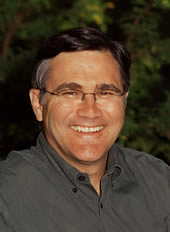 Curtin University Library. Geoff Gallop Collection. Records of Geoff Gallop. Geoff Gallop, ca. 2006. GG00020/110.
Curtin University Library. Geoff Gallop Collection. Records of Geoff Gallop. Geoff Gallop, ca. 2006. GG00020/110.
In the only television debate during the campaign, Gallop emphasised 'his commitment to confront problems with basic services' and clearly succeeded in moving his party away from the WA Inc. image. There was also a firm commitment to seek to end malapportionment in Western Australia's electoral system.
The new ministry was sworn in less than a week after polling day. As promised during the election, Gallop reduced the size of the ministry from seventeen to fourteen, including three members of the Legislative Council. He himself took on the portfolios of Public Sector Management, Federal Affairs, Science and Citizenship and Multicultural Affairs. The government made a cautious start, delaying its first budget until August. It established task forces and review committees to oversee government expenditure; services and resources available to government schools; the machinery of government with a subsequent report leading to a halving of the number of government departments; and health issues. In August a Drug Summit was also held. The premier honoured his pre-election commitment to adopt a ministerial code of conduct; a Royal Commission was established to investigate the finance brokers issue; the ending of logging in old growth forests was essentially put in place and the go-ahead was given to the building of a new Perth Convention Centre.
From the outset Gallop set out to chronicle his government's achievements on a regular basis and the scope and coverage of these bulletins are outlined in The Gallop Government: Achievement Reports. There is little doubt that this was probably the most self-documented government in the State's history.
However, controversy soon developed in parliament during 2001 with the government, even with Greens support, still one vote short in the Legislative Council of the constitutional majority needed to reform the State's malapportioned electoral system. There was also heated debate over the Lesbian and Gay Law Reform Bill and the Family Law Amendment Bill which sought to provide equal treatment for de facto couples (including same sex couples) when their relationship broke down. In December 2001 the long awaited Royal Commission into the Police Force 32 was set in motion. The year ended with a federal election in which Labor lost a little ground compared with its performance in 1998.
During the first half of 2002 (the period when Labor's victory in South Australia meant the party now held a majority in all six states and two territories) much parliamentary time was occupied in debates over the Gallop Government's attempts to reform the industrial relations system. The Government set out to repeal the Court Government's workplace agreement framework, enshrine union involvement in collective workplace bargaining and provide for minimum workplace conditions and unfair dismissal laws.
During these sittings too the gay and lesbian law legislation passed through the upper house and the government endorsed a range of significant amendments to the Adoption Act. However, in October the government suffered an important setback when the Supreme Court ruled that the electoral reform legislation, which had passed with a simple but not a constitutional majority in the Legislative Council, could not be presented for the Royal Assent.
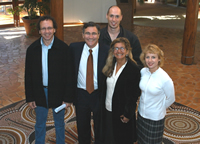 Curtin University Library. Geoff Gallop Collection. Records of Geoff Gallop. Geoff Gallop at Curtin University of Technology, Centre for Aboriginal Studies, 2004. GG00020/28
Curtin University Library. Geoff Gallop Collection. Records of Geoff Gallop. Geoff Gallop at Curtin University of Technology, Centre for Aboriginal Studies, 2004. GG00020/28
In the wake of this setback the government then decided to lodge an appeal with the High Court while also pursuing, ultimately unsuccessfully, the idea of giving the President of the Legislative Council a deliberative in lieu of a casting vote.33
During the period just prior to Christmas 2002 the issue of extended shopping hours was placed firmly on the agenda when Gallop announced that Western Australia faced losing up to $70 million dollars in National Competition Funds if his government 'refused to introduce seven days a week trading'.34 Reaction from the business community was divided with strong opposition to change from 'small business' organisations and support from the Chamber of Commerce. A few months later the Premier announced that retail trading hours would remain unchanged until after the election.
Environmental issues also were a source of controversy in this period with Gallop, like his Queensland counterpart Peter Beattie, less enthusiastic about supporting the ratification of the Kyoto protocols than was New South Wales Premier, Bob Carr. However, the major source of controversy was the debate over the proposed establishment of a resort at Mauds Landing in the southern portion of the Ningaloo Marine Park in the north-west of the state. After many months of debate Gallop himself took responsibility for the issue and flew to Ningaloo in July to announce that 'we have drawn a line in the sand and ... will not accept developments that threaten the precious and fragile coast'.35 His decision was widely applauded by conservationists but opposed by his Labor counterpart Fred Riebeling, the Speaker of the Legislative Assembly and the local member for the area.
In September, in the wake of the Ningaloo decision, Gallop released a paper 'Hope for the Future: The Western Australian State Sustainability Strategy' which is discussed further in Geoff Gallop: Research and Writings. The government faced difficulties however in making an environmentally based decision on the Chevron-Texaco Gorgon gas project at Barrow Island, which was reckoned as an $11 billion dollar project. The decision was controversial because of the likely reaction of 'green' groups and because of the difficult issue of entitlement to royalties and the distribution of revenue with the Commonwealth. 36
One election commitment which the government was able to honour was the repeal of the voluntary student unionism legislation introduced by the Court Government. Under the new legislation universities were empowered to impose compulsory amenities and service fees, a decision which in turn was later reversed by the Howard Government after it secured control of the Senate. The government also legislated for the establishment of a professional body that would have control over the recognition of qualifications, teaching standards and membership of the teaching profession. Action was taken to delete the Fremantle bypass reservation from the Metropolitan Region Scheme 37 and legislation passed to enable the Perth to Mandurah passenger railway being built along the Kwinana freeway strip to be connected to the existing suburban rail system: the government had earlier decided to alter the route from the Kenwick route agreed to by the Court Government to a rail line down the centre of the freeway to the city.
In an address at the commencement of his government's third year in office Gallop claimed that 'the best was still to come' and that his government was committed to being 'fiscally conservative, socially progressive, environmentally sensitive and aggressively economic' with the main challenges coming in the areas of 'health, environmental, electoral and electricity reform'. 38 In the wake of this statement, the Government in March appointed New South Wales Health Director Michael Read to lead a health reform committee to review the State's health budget.
In the light of subsequent events a particularly important legislative package which passed through Parliament in the first half of 2003 included the bills to establish a new Crime and Corruption Commission (CCC) operating as 'a permanent Royal Commission into police, the public sector and organised crime'.
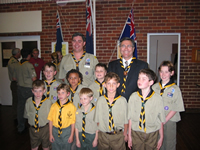 Curtin University Library. Geoff Gallop Collection. Records of Geoff Gallop. Geoff Gallop with a group of Boy Scouts, 2004. GG00020/49
Curtin University Library. Geoff Gallop Collection. Records of Geoff Gallop. Geoff Gallop with a group of Boy Scouts, 2004. GG00020/49
The bills gave the CCC, which came into existence on 1 January 2004, power to 'compel witnesses to give evidence and the capacity to hold public hearings'. Its activities would be overseen by a Parliamentary Inspector who would report to Parliament and the relevant joint standing committee. Another important set of bills were debated in Parliament dealing with electricity reform and designed to split the utility into four arms and open the electricity market to competition.
One move which was the result of a personal initiative by Gallop was the announcement that a curfew policy would apply in the Perth nightlife centre of Northbridge. Under this arrangement children under 13 would not be allowed on the streets of Northbridge unless they were under the care of a parent or responsible adult: and from 10pm the same restriction would apply to unsupervised children aged between 13 and 15.
Much of the first half of 2004 was spent on wranglings within the various parties about pre-selection for the forthcoming federal and state elections. In March the final report in the Read Review process was received focussing on the amalgamation of the Princess Margaret Hospital for Children and Sir Charles Gairdner Hospitals and the construction of a new 600 bed teaching hospital in the southern suburbs. The Opposition did not support the plan as it stood and clearly it would take many years to implement. In the short term, too, Gallop faced considerable hostility over the decision not to build a new hospital at Moora, a town just under 200 kilometres north of Perth. He eventually gave way in the face of the controversial tactic by the Moora action groups of delivering loads of bricks to the Premier at every opportunity.39
March was also the month when the final report of the Royal Commission into the Police Force was tabled in Parliament: the report received mixed reviews with its findings that there had been 'significant and sustained' corruption over a twenty year period but with little likelihood of a significant number of prosecutions or disciplinary proceedings as a consequence.
A great deal of attention was also given during 2004 to the future of Ningaloo Coral Bay and a flood of ministerial statements appeared on the issue between May and July 2004.40 The local member North West Coastal MLA and Speaker Fred Riebeling, who had initially opposed the decision to veto the Ningaloo marina project, joined with the Premier in producing a major paper entitled 'Building a better future for North West Coastal'.
In July the government announced the construction of a new desalination plant at Kwinana, an industrial suburb south of Perth, to become the State's next major water source. The plant was anticipated to be operating by July 2006 and would supply an extra 45 gigalitres of water into the Water Corporation's scheme.
Labor's poor performance in Western Australia in the federal election in October when its representation was reduced from 8 to 6 of the 15 House of Representatives seats in the West did not bode well for the forthcoming state election. Important legislation passed in the latter stages of the outgoing parliament included the Working with Children (Criminal Record Checking ) Bill requiring all people engaged in child-related work, paid or unpaid, to have criminal record checks to assess their suitability; and, as a private members bill, legislation to confirm the extent of parliamentary privilege in the Parliament. In December Gallop announced that changes to health regulations providing for a ban on smoking in all enclosed public places (and within five metres of state government building entrances) would be phased in over a two year period. Finally, in a late decision the government legislated for a referendum on possible extended retail shopping hours but rejected an attempt to hold simultaneously a referendum on daylight saving.41
When the election was held on 26 February 2005 the government was returned with a virtually unchanged majority, following a campaign in which Opposition leader Colin Barnett had committed his party to a proposal to bring water by canal from the far north of the state to the metropolitan area, a commitment which contrasted markedly with the Gallop Government's more immediate focus on the construction of the desalination plant at Kwinana. There were also clerical errors in the Liberal Party's final costings of its policies which served to undermine its position further.42 Interestingly, both shopping hours referendum proposals were convincingly defeated.
The most immediate consequence of Geoff Gallop's second election victory was that it provided the opportunity for the implementation of the long cherished ambition of the Premier and his party to secure something approaching the one-vote-one-value electoral system.
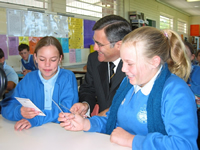 Curtin University Library. Geoff Gallop Collection. Records of Geoff Gallop. Geoff Gallop presenting commemorative coins to students at Wilson Primary School, 2004. GG00020/64
Curtin University Library. Geoff Gallop Collection. Records of Geoff Gallop. Geoff Gallop presenting commemorative coins to students at Wilson Primary School, 2004. GG00020/64
This occurred because in the hiatus period between the election date and the Legislative Council changeover on 22 May, the resignation of Liberal MLC Alan Cadby in 2004 had left the door open for the dissident member to support Labor and the Greens, providing the necessary constitutional majority for change. Ultimately, the legislation which passed provided for a modified form of one-vote-one-value in the Legislative Assembly though leaving the Legislative Council seats divided evenly between city and country members despite the substantial disparity in population between the two regions.
The new ministry was increased back to the seventeen members which was the situation before Gallop's election in 2001. The Premier himself added the contentious Water Resources portfolio to Public Sector Management and Federal Affairs. Early in June, Gallop also announced the appointment of Dr Ken Michael, a former Commissioner of Main Roads, as the State's new Governor to succeed Lieutenant General John Sanderson. One source of controversy on which the Government did receive bipartisan support was when the Public Accounts Committee of the Legislative Assembly reported that Western Australia had not breached the 1999 GST Agreement when it refused to abolish stamp duty and some other residual taxes.
Controversy in the months that followed centred around such issues as the Outcomes-Based education changes 43 ; the decision of the government to give public servants time off to attend protest meetings concerning the federal government's work choices industrial legislation, and the debate over nuclear energy. On this latter issue Gallop took a very strong stand asserting that he would not approve uranium mining in Western Australia and that he would oppose any move by the Commonwealth Government to place a nuclear waste dump in Western Australia. This subsequently led to some criticisms from within the party at both a state and federal level but a damaging debate was avoided in the November ALP Conference.
Throughout the second half of 2005 Gallop continued to receive high satisfaction ratings as Premier even when his party fell a little behind in the polls. In October he accepted the resignation of Cabinet Minister Bob Kucera arising from a conflict of interest issue relating to cabinet discussions of the future of Alinta gas at a time when Kucera's wife held shares in the company. Following the London bombings in July and a meeting with other Premiers and Prime Minister Howard, Gallop agreed to the introduction in September of the Terrorism (Extraordinary Powers) Bill 2005. With some amendments the bill was passed though with provision for a ten year sunset clause and three yearly reviews of the legislation. During the session the parliament also secured the passage of legislation to restructure Western Power, the state-owned electricity supplier and it continued to endeavour to fend off criticisms arising from the Outcomes Based Education (OBE) system. In September it unveiled its Clinical Services Framework centred on plans to restructure Perth's hospitals over the next ten years. and the tender process was reopened for the construction of a proposed multipurpose stadium but with no decision yet announced on the site of the stadium.
Then on 16 January 2006, in a 'bombshell' announcement, Gallop announced his resignation as Premier and MLA for Victoria Park citing clinical depression as the reason for the decision. A new Ministry was quickly sworn in with Alan Carpenter as the new Premier. A few months later Gallop accepted a university appointment in Sydney. In all Gallop had served for over twenty years as an MP and was Premier for five years winning two elections in the process. He had led the Labor Party for more than nine years.
While premier, Gallop had delivered a number of interesting addresses including one to the Western Australian Business Economics Forum on 10 April 2001 with the theme 'An Internationally Competitive Western Australia: What Can the Government Do'.44 At that stage he had suggested that with the economy 'in good shape' the government's task was to build on the state's competitive strengths and to diversify the economic base. The three key areas he identified were:
- Developing Western Australia's role in the knowledge based economy
- Maintaining a global focus
- Adding to the State's infrastructure
He also emphasised the State's unfavourable treatment from the Commonwealth Grants Commission.45
In July 2004, when the Business Review Weekly published a series of short articles on the states and territories in terms of what distinctive attributes and strengths each could offer. Geoff Gallop's short piece on WA was headed, 'Big, bigger and booming'. He wrote of a state with a high level of economic activity while still providing a very affordable place in which to live and do business'.46
With his retirement from politics and appointment as director of the Graduate School of Government at the University of Sydney, Gallop was now in a position to enter into a new phase of his life, one which was to be marked by a fresh burst of academic activity.
Perhaps his major legacy to the Labor Party in Western Australia had been to remove the party from the taint of WA Inc. and many would accordingly argue that it was particularly disappointing that some of the subsequent decisions of his successors had seemingly led to a return to the problems he had worked so hard to avoid. Nevertheless, very much a thinker about the process of government and the ends to be sought, Gallop found himself in the ideal position in his post politics years to pursue those ideas across a range of issues.


